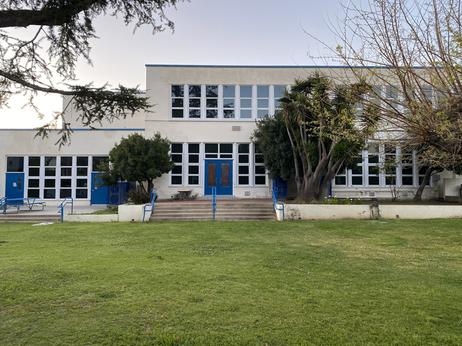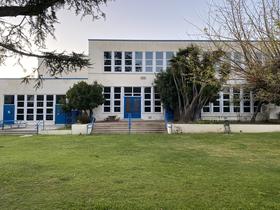Inside DoDEA Schools: Background
As someone who has taught various subjects and served as a deputy director in a private school, I can only imagine what it must be like to run a global educational system like the Department of Defence Schools (DoDEA). Let's look at the teacher qualifications, how much the tuition and costs are, and how the schools are accredited.
The Department of Defense Schools trace their roots to the aftermath of World War II.
- In 1946, the Department of the Army established the first schools for dependents of service people in occupied Germany, Austria, and Japan.
- These schools served children of American military personnel stationed abroad. Initially, the Army, Navy, and Air Force operated their schools separately.
Then, in 1964, the Secretary of Defense combined these into a single system.
- The Defense Dependents Education Act of 1978 formally established the Defense Dependents' Education System, authorizing the Secretary of Defense to operate a free public education system for eligible overseas dependents.
- This act provided Congressional authorization for the schools. Over time, the system has evolved.
- In 1992 it became known as the Department of Defense Education Activity (DoDEA), incorporating overseas and domestic schools.
- Today, DoDEA operates as a field activity of the Office of the Secretary of Defense, serving military families worldwide.
This video offers a look at the DoDEA schools in Europe.
Teacher Qualifications
DoDEA maintains high standards for its educators, both in the U.S. and abroad.
- Teachers must hold a baccalaureate degree from an accredited institution and have completed at least 40 semester hours in general education courses.
- Additionally, they need 18 semester hours of professional teacher education coursework and must have completed a student teaching or internship program.
- This is how the DoDEA can create a well-rounded corps of teachers and administrative staff capable of delivering quality education across various subjects.
- For those without a state teaching license, DoDEA accepts current Praxis I and II test scores and a completed student teaching internship.
- This flexible approach helps the DoDEA schools attract talented educators who may have taken non-traditional paths to teaching.
Tuition and Costs
DoDEA schools are generally tuition-free for children of active-duty military members.
- That's a significant benefit for military families. However, federally connected and non-federally connected students pay tuition calculated annually by the DoDEA Headquarters Resource Management Division.
- This structure ensures military families have access to quality education while also allowing others to benefit from the DoDEA system.
Grades offered
In addition to the usual K-12 grades found in our schools stateside, the DoDEA Schools offer a Universal pre-kindergarten.
The Department of Defense Education Activity (DoDEA) is pleased to announce the implementation of Universal Prekindergarten in 80 locations for School Year 2024-2025. This initiative marks the first phase of a comprehensive three-phase plan to enhance early childhood education within the DoDEA school system. Source: DoDEA
The DoDEA also offers support for homeschooling.
DoD dependent students who are educated in a home-school setting but are eligible to enroll in DoDEA-Europe and DoDEA-Pacific and live within the commuting distance of the DoDEA school are entitled to use or receive the specified auxiliary services without being required either to enroll in or register for a minimum number of courses offered by the school. Source: DoDEA Homeschooling
This video reports on how the DoDEA schools offer a state-of-the-art curriculum.
Curriculum
DoDEA schools follow a comprehensive PreK-12 program.
- As a teacher and parent, I appreciate the importance of a comprehensive curriculum that serves a wide variety of abilities, interests, and needs.
- From Advanced Placement courses to Career Technical Education, Host Nation Studies, and World Language Studies, the DoDEA understands the constituency it serves.
- The families of service people rarely stay in one place for very long.
Hence, the consistency of the DoDEA curriculum is a significant component in the support mechanisms our country provides to those who serve and protect our nation.
More than 125 high school students across DoDEA Pacific recently participated in the first-ever STEM Program Advancing Research Knowledge (SPARK!)
SPARK! is a program partially funded by the Army Educational Outreach Program (AEOP) whose purpose is to effectively engage, inspire, and attract the next generation of STEM talent and expose them to Department of Defense STEM careers. At SPARK! students had the opportunity to attend college and career workshops from current researchers and STEM professionals from the Army Corp of Engineers, Kadena Medical Facility, USN Hospital Okinawa, and various research universities in the US. Source: DoDEA
Graduation Credentials
Upon completion of their studies, DoDEA students are awarded either a standard or an honors diploma. The requirements for these diplomas vary according to when a student enters 9th grade, reflecting the evolving nature of educational standards and expectations.
Accreditation
DoDEA schools have a long-standing history of accreditation.
- Cognia accredits all DoDEA schools.
- This accreditation is crucial as it ensures that DoDEA schools maintain high standards and are recognized for their quality education.
- Many DoDEA schools have been recognized as Schools of Distinction by Cognia.
As someone who has been involved in school administration, I can attest to the importance of such recognition in validating a school's commitment to educational excellence.
The DoDEA system demonstrates a strong commitment to providing high-quality education to military families and others around the world.
By maintaining high teacher qualifications, offering accessible education, following comprehensive curricula, awarding recognized diplomas, and achieving acclaimed accreditation, DoDEA schools ensure that the children of our service people receive a world-class education, no matter where they are posted.
What do others have to say about DoDEA schools?
In conclusion, here's what others have to say about DoDEA schools.
This school system outperformed all 50 states on reading and math scores for both eighth graders and fourth graders.
and
The schools also have smaller learning gaps between white and both Black and Hispanic students. Source: The New York Times
Over the past decade, Department of Defense Education Activity (DODEA) students in the fourth and eighth grades have generally received among the highest assessment scores nationwide in math and reading, according to our analysis of National Assessment of Educational Progress (NAEP) data. For example, in 2019, DODEA's average scores for the fourth grade math and reading assessments were higher than 98 percent and 100 percent of states, respectively. DODEA also generally had a higher percentage of students scoring at or above proficient on the fourth and eighth grade math and reading assessments, compared to other states. Source: General Accounting Office (GAO)
Conclusion
The Department of Defense Education Activity stands as a shining example of educational excellence in action. With its impressive academic outcomes—outperforming all 50 states in reading and math scores for both fourth and eighth graders—DoDEA schools demonstrate what's possible when high teacher qualifications, comprehensive curriculum, and strong institutional support converge. Perhaps most remarkable is their success in narrowing achievement gaps between white students and both Black and Hispanic students, an accomplishment many school systems strive to achieve. For military families facing frequent relocations and unique challenges, DoDEA provides not just educational stability but truly exceptional learning opportunities. As our nation continues to search for models of educational success, we need look no further than this remarkable system that serves the children of those who serve our country. The DoDEA's commitment to excellence ensures that military dependents receive nothing less than the world-class education they deserve, no matter where duty calls their families.
Questions? Contact us on Facebook and Instagram. @privateschoolreview
#DoDEASchools #MilitaryEducation #QualityLearning #GlobalClassrooms #ServiceMemberFamilies























